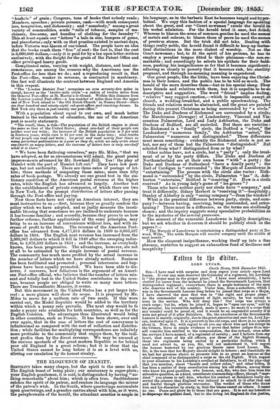THE ELOQUENCE OF INANITY.
&ENMITY takes many shapes, but the spirit is the same in all. The English boast of being plain ; our aristocracy is super-plain; your English gentleman, it is said, is distinguished by having "no- thing remarkable" about him ; which is often true. Snobbishness catches the spirit of its patron, and renders its language the mirror of the patron's wish. In the South, where quarterings accumulate woe quartering; and a grandee carries about with him, as it were, the paraphernalia of the herald, the attendant courtier is ample in his language, as in the barbaric East he becomes turgid and hyper- bolical. We copy this fashion of a special language for speaking about the great, and our "Court newsman" excels the herald in his verbal adulation. For the herald tried it once but failed; Whereas to blazon the arms of common gentles he need the namisi of metals and colours, to blazon those of peers.he used the names of precious atones. But the trick did not take. Dealing with things really -noble, the herald found it difficult to keep up fantas- tical distinctions in the mere dialect of worship. Not so the Court newsman ; but, to fit the spirit of his patrons, he has Au employ a peculiar tongue fitted to their plainness—the non-re- markable; and accordingly he selects his epithets for their bald- ness, pushing his insignificance so far that at becomes significant; adhering so closely to poverty that it becomes rich, his sterility pregnant, and through no-meaning meaning is engendered. Our great people, like the little, have been enjoying the Christ- mas in their homes, and the public has to be told as much. The herald of the morn describes them—but in his special slang. Thay have friends and relatives with them, but it is Impolite to beet° descriptive and suggestive. The word "friend" implies feeling, " relative " may suggest emotion,—which is impossible except ut church, a wedding-breakfast, and a public speechmaking. The friends and relatives must be abstracted, and the great are painted during this present Christmas as being surrounded by "a circle." The Duke and Duchess of Richmond are surrounded by-a eirale,; the Marchioness (Dowager) of Londonderry, Viscount and Vis- countess Palmerston, Lord and Lady Ashburton, the Duke and Duchess of Bedford, are all encircled. But there are varieties : the Richmond is a " family " circle, the Bedford a "select," the Londonderry "numerous family," the Ashburton "select," the Palmerston "numerous and distinguished." These differences must mean something: evidently the Richmond circle is not se- lect, nor any of them but the Palmerston "distinguished." But selected from what ? distinguished from or by what ? Other nobles have, not a circle, but a " party "; only the treat- ment of or by the party differs. The Duke and Duchess of Northumberland are at their own house "with" a party ; the Duke and Duchess of Sutherland "have a family party ' ; the Earl of Cardigan is " surrounded " ; the Marquis of Lansdowne is "entertaining." The process with the circle also varies : Rich- mond is " surrounded " by the circle, Palmerston "has" it, Aal- bur ton "entertains," Bedford is " receiving " it. How.is a circle received ? As in young lady's game of " les graces " ?
Those who have neither party nor circle have "company," and treat it differently. Sidney Herbert is "receiving it"—hospitably ; Stanley of Alderley is only "seeing company "--from the window?
What is the practical difference between party, circle, andoom- pany ?—between having, receiving, being surrounded, and enter- taining? There must be .a difference, as the terms are studiously chosen ; and the inquiry suggests many speculative probabilities as to the mysteries of the several processes. The account of the venerable Lansdowne is highly descriptive. but we ask whether in decorum it should be publicly stuck an the papers ?— " The Marquis of Lansdowne is entertaining a distinguished party at Bo- wood, Wilts. The noble Marquis will receive company until the middle ef next month."
How the eloquent insignificance, working itself up into a fine phrensy, contrives to suggest an exhaustless fund of drollness and receptivity !


























 Previous page
Previous page